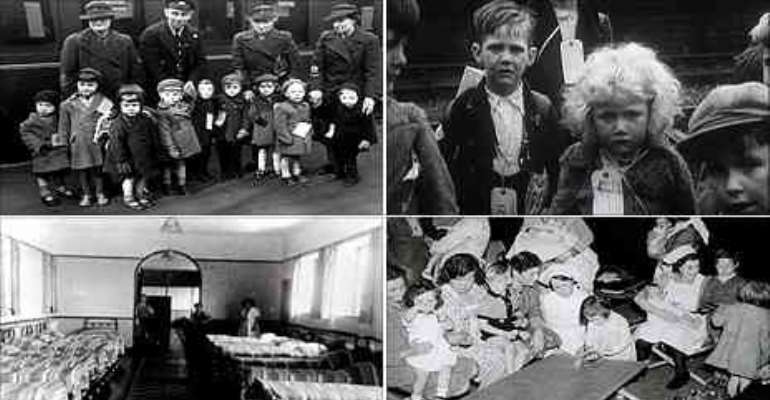EVACUEES FROM GUERNSEY RECALL LIFE IN SCOTLAND

The parents had no idea where their children were placed
On 21 June, 1940, more than 1,300 bewildered children arrived in Glasgow – a city most of them had never even heard of.
Only two days before, these youngsters had been enjoying a carefree afternoon, swimming or playing after school on the beautiful and peaceful island of Guernsey.
The Channel Islands had been largely unaffected by the start of the war.
Continue reading the main story
TV DOCUMENTARY
Escape to Glasgow will be broadcast on BBC1 Scotland on Sunday 14 November at 2225 GMT
Read the stories of the evacuees
But that summer, the sound and flashes of gunfire could be seen and heard across the sea in nearby France. The German army was advancing.
The British government decided the Channel Islands could no longer be defended.
On Guernsey, all children aged five to 14 were evacuated, unless their parents chose to keep them with them.
It was the stuff of nightmares.
To send your children away to an unknown place, in the hope they'd be taken in by strangers – not knowing when, or even if, you'd see them again.
Most of the children had never been on a ship before they set sail in 1940
In the middle of the night, at schools around the island, parents hugged their youngsters and waved them off.
Clutching pillowslips or bags containing a couple of vests, pants and socks, perhaps a favourite toy, something to eat on the journey, the children were bundled on to buses.
They were driven to an assortment of waiting ships in the harbour, many coming straight from the Dunkirk landings.
Arriving on the south coast of England hours later, they were checked over, fed and watered and bundled onto trains heading north.
Most of these young people had never been on a ship before. They'd never left the island.
They'd never seen a train, a busy road – or a black and white cow.
The youngest were terrified, grief-stricken and missing their families. They'd left behind everything and everyone they'd ever known.
Some of the older kids regarded it as all as a bit of an adventure. For the teachers and helpers accompanying them, it was an onerous responsibility.
Beds were provided for the children at St Ninian's Church
Church halls around the city of Glasgow had been preparing for the mass influx.
At St Ninian's on the south side, rows of beds were lined up.
Volunteers were on hand to welcome the evacuees. It was ironic, when so many of Glasgow's own children had already been sent out of the city.
Over the coming days and weeks, the majority of children were billeted with families who offered them a temporary home.
But siblings were often separated, and many of the placements were far from successful and hugely traumatic. For many, it was a lonely and unhappy time.
The bustling, dirty, noisy city and the strange accent were a world away from the sea and sands of Guernsey.
Others settled in quickly, welcomed by loving families. They thrived on the excitement of the big schools, buses and trams, cinemas, dance halls, and holidays in the likes of Rothesay.
Most of the evacuees who spent the rest of the war in Scotland did their growing up in their five years here.
Back on Guernsey, the Germans had invaded within hours of the evacuation.
Most of the children returned to Guernsey by the end of the war in 1945
Under German occupation life was hard – made worse by the worry over what had happened to the island's children.
It was months before most parents heard that their offspring were alive and being cared for in Scotland.
Telegrams from the Red Cross were the only form of communication for the remainder of the war.
A maximum of 25 words, sent through the organisation in Geneva, provided treasured news.
These carefully worded, coded messages are a poignant reminder of that long separation.
In 1945, at the end of the war, the majority of the children made the return trip home to families who barely recognised their grown-up, independent offspring.
They'd come back to Guernsey “talking Scotch” and telling stories of a very different life.
Many missed their adopted families in Scotland, and maintained contacts with friends made there throughout their lives.
Now in their 70s and 80s, they can look back on a time and experience which shaped their lives.
